
Libertad Lamarque Bouza was an Argentine and Mexican actress and singer, became one of the most iconic stars of the Golden Age of cinema in both Argentina and Mexico. She achieved fame throughout Latin America, and became known as "La Novia de América". By the time she died in 2000, she had appeared in 65 films and six telenovelas, had recorded over 800 songs and had made innumerable theatrical appearances.
Adiós Argentina is a 1930 Argentine musical film directed and written by Mario Parpagnoli. The film starred Ada Cornaro and Pierina Dealessi. Libertad Lamarque also made an appearance at the age of 22 as the Bride of the Homeless.

To the Heart is a 1996 Argentine documentary musical film directed and written by Mario Sábato. The film starred Libertad Lamarque and Alberto Castillo. The film explores the history of tango dancing in Argentina, and was filmed in Buenos Aires, Argentina.

The Soul of the Accordion is a 1935 Argentine tango musical film from the Golden Age of Argentine cinema directed by Mario Soffici, who wrote it with José A. Bugliot. It is considered one of the earliest classics of Argentine cinema.

Help Me to Live is a 1936 Argentine musical melodrama film directed and written by José A. Ferreyra with Libertad Lamarque. Starring Libertad Lamarque and Santiago Gómez Cou, the film premiered on 26 August 1936 in Buenos Aires. A typical tango-based film of the Golden Age of Argentine cinema, its international success gave a great boost to the booming Argentine film industry.
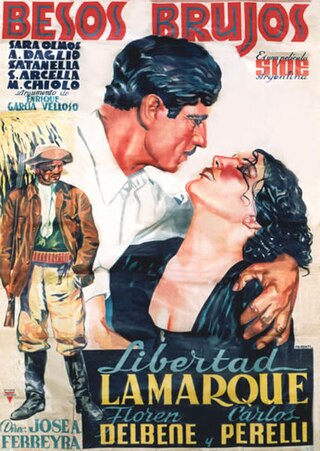
Bewitching Kisses is a 1937 Argentine romantic drama film musical of the Golden Age of Argentine cinema directed and written by José A. Ferreyra, based on a story by Enrique García Velloso. Starring Libertad Lamarque and Floren Delbene.

Caminito de Gloria is a 1939 Argentine musical melodrama film written and directed by Luis César Amadori during the Golden Age of Argentine cinema. The film stars Libertad Lamarque, who sings "Caminito", the celebrated 1926 tango composed by Juan de Dios Filiberto with lyrics by Coria Peñaloza originally popularized by Carlos Gardel and Ignacio Corsini. In 1960 Amadori remade this film under the title Mi último tango, starring Sara Montiel in the role previously played by Lamarque.
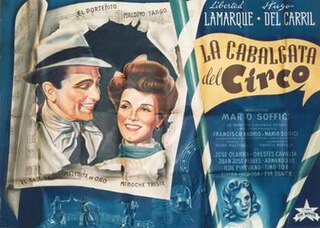
The Circus Cavalcade is a 1945 Argentine musical film directed and written by Mario Soffici with Eduardo Boneo and Francisco Madrid, during the classical era of Argentina cinema. The film was shot on black-and-white stock with a monaural soundtrack. It stars Libertad Lamarque and Hugo del Carril.
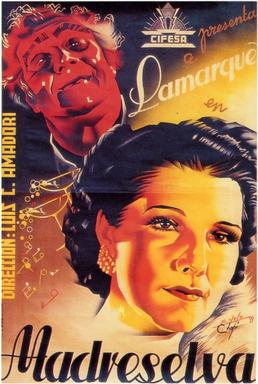
Honeysuckle is a 1938 Argentine melodrama musical film directed by Luis César Amadori. With Ivo Pelay, Amadori co-wrote the play upon which the film is based. Starring Hugo del Carril, Libertad Lamarque and Malisa Zini, it premièred in Buenos Aires on 5 November 1938 and was a popular success. Its plot is loosely based on the lyrics of a tango song of the same name. It is a tango film, an extremely popular genre during the Golden Age of Argentine cinema (1930s–1950s). It was screened at the Venice Film Festival.
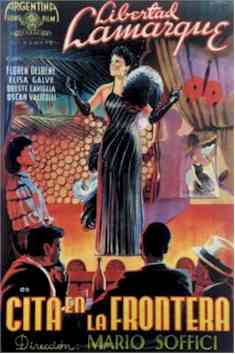
Cita en la frontera is a 1940 Argentine film of the Golden Age of Argentine cinema directed by Mario Soffici and starring Libertad Lamarque.
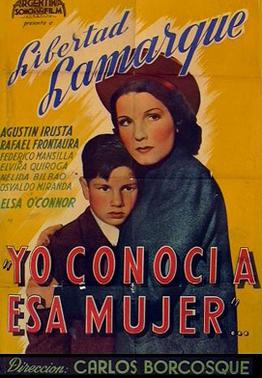
I Knew That Woman is a 1942 Argentine melodrama film of the Golden Age of Argentine cinema, directed by Carlos F. Borcosque and starring Libertad Lamarque and Agustín Irusta.
El fin de la noche is a 1944 Argentine film of the classical era of Argentine cinema. It is notable for being an anti-Nazi film made in neutral Argentina during World War II and set in occupied France. Shot from August to November 1943 in Cordoba Province, the release was put on hold for more than a year, pending authorization by the pro-Axis military government of that time. The film is also remembered in Argentina for Libertad Lamarque's performance of the tango Uno, composed by Mariano Mores and Enrique Santos Discépolo.

Gran Casino is a 1947 Mexican film. It was written by Mauricio Magdaleno and Edmundo Baez, based on a story by Michel Weber, and directed by Luis Buñuel.
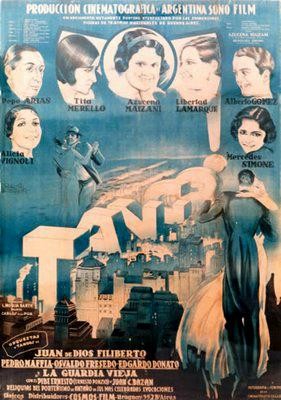
¡Tango! is a 1933 Argentine musical romance film, the first film to be made in Argentina using optical sound technology Many existing stars of the Argentine stage and radio appeared in the film, but its success was limited due to poor sound quality and weak acting. ¡Tango! established a formula that would be used by many subsequent tango films.
A Few Drinks is a 1958 Mexican musical film written and directed by Tulio Demicheli and starring Libertad Lamarque, Miguel Aceves Mejía and Raúl Ramírez.
Lovely Memory is a 1961 Mexican-Spanish musical drama film directed by Antonio del Amo and starring Joselito, Libertad Lamarque and Sara García.
My Last Tango is a 1960 Spanish drama film directed by Luis César Amadori and starring Sara Montiel, Maurice Ronet and Isabel Garcés. A former maid enjoys success as a tango performer in Argentina.

Woman Without Tears is a 1951 Mexican historical drama film directed by Alfredo B. Crevenna and starring Libertad Lamarque, Marga López and Ernesto Alonso.

Another Spring is a 1950 Mexican drama film directed by Alfredo B. Crevenna and starring Libertad Lamarque and Ernesto Alonso.

The Lady of the Veil is a 1949 Mexican drama film directed by Alfredo B. Crevenna and starring Libertad Lamarque, Armando Calvo and Ernesto Alonso. The film's sets were designed by the art director Jesús Bracho.
This page is based on this
Wikipedia article Text is available under the
CC BY-SA 4.0 license; additional terms may apply.
Images, videos and audio are available under their respective licenses.














